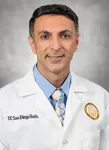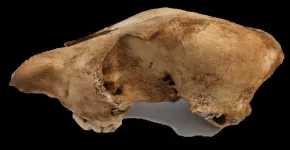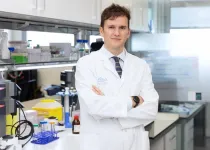(Press-News.org) UC San Diego Health is the first health system in San Diego County to offer a new bladder-saving gene therapy to treat localized bladder cancer.
The novel treatment is the first and only FDA-approved gene therapy delivered directly into the bladder for non-muscle-invasive bladder cancer (NMIBC). Called nadofaragene firadenovec (Adstiladrin), the gene therapy addresses an unmet need for patients who are no longer responding to the longstanding first line of defense — bacillus calmette-guerin (BCG), a bacteria-based immunotherapy for cancer management. While BCG is a common first therapy, it can eventually stop working, ultimately leading to complete bladder removal.
The American Cancer Society estimates that 83,000 new cases of bladder cancer will be diagnosed this year, and approximately 17,000 will die of the disease. NMIBC is the most common type of bladder cancer, accounting for nearly 75% of cases. It is a type of localized bladder cancer that has not metastasized or invaded into the muscle wall of the bladder.
"The primary treatment for NMIBC in the past typically involved surgical resection, followed by therapies into the bladder, like immunotherapy or chemotherapy. Unfortunately, if these interventions proved ineffective, the standard course of action involved bladder removal, which poses a substantial morbidity risk,” said Amirali Salmasi, MD, associate professor of urology at University of California San Diego School of Medicine, urologist at UC San Diego Health and UC San Diego Moores Cancer Center member. “This innovative gene therapy approach holds promise in delaying or even eliminating the necessity for bladder removal.”
UC San Diego Health urologists have initiated the bladder gene treatments on five patients to date. The gene therapy dosing is delivered once every three months into the bladder through a urinary catheter and is a treatment option for any patient who is no longer responding to BCG therapy.
Here’s how it works: The bladder therapy is a recombinant adenovirus gene therapy, which uses a form of a virus to deliver genetic material into a cell. When instilled into the bladder, it infiltrates the bladder cells and delivers a gene encoding interferon — a natural substance that helps the body’s immune system fight disease — which is incorporated into the cells’ DNA. The bladder cells then express the interferon, which blocks bladder cancer growth.
“This exciting gene therapy represents a significant milestone for bladder cancer treatment. There have been limited advancements for patients who are unresponsive to BCG treatment — until now,” said Aditya Bagrodia, MD, associate professor of urology at UC San Diego School of Medicine, urologic oncologist at UC San Diego Health and UC San Diego Moores Cancer Center member.
UC San Diego Health offers comprehensive bladder cancer care and is repeatedly ranked among the nation’s best in both cancer care and urology by U.S. News & World Report.
“As the region’s only NCI-designated Comprehensive Cancer Center, UC San Diego Health is a champion of implementing innovative new therapies system-wide,” said Diane Simeone, MD, director of Moores Cancer Center at UC San Diego Health.
Moores Cancer Center at UC San Diego Health is the only National Cancer Institute-designated Comprehensive Cancer Center in San Diego County, the highest possible rating for a U.S. cancer center. NCI recognizes centers around the country that meet rigorous standards for transdisciplinary, state-of-the-art research focused on developing new and better approaches to preventing, diagnosing, and treating cancer.
# # #
END
UC San Diego health offers novel gene therapy for bladder cancer
While bladder cancer treatment can require removal of the bladder, new FDA-approved therapy offers bladder-saving approach
2024-07-08
ELSE PRESS RELEASES FROM THIS DATE:
SETI Institute awards its first research and education innovation grants
2024-07-08
July 8, 2024, Mountain View, CA – Today, the SETI Institute announced the first projects it will fund with a new program to Support Technology, Research, Innovation, Development, and Education programs – or STRIDE. The SETI Institute established the $500K STRIDE fund for SETI Institute researchers and EOC (Education, Outreach, and Communications) professionals to develop innovative research and education proposals. The first five grants awarded will support projects that:
analyze Earth’s colors and climate to create detectors for studying exoplanets
develop a multi-backend capability for ...
Study reveals environmental impact of artificial sweeteners
2024-07-08
The human body’s inability to break down sucralose, an artificial sweetener found in many zero-calorie food and drink products, is well established by scientific research. The compound is so stable that it escapes wastewater treatment processing and is in drinking water and aquatic environments.
“We can't break down sucralose, and a lot of microorganisms can't break it down, either, because it's a really tough molecule that doesn't degrade easily. So there are a lot of questions about how it is affecting the environment ...
Ancient dingo DNA shows modern dingoes share little ancestry with modern dog breeds
2024-07-08
DNA from fossilised dingo remains going back 2746 years compared with modern dingoes’
Dingos arrived in Australia more than 3000 years ago
K’gari dingoes have no domestic dog ancestry – they are pure dingo
Co-lead author, paleogeneticist Dr Sally Wasef, from QUT’s School of Biomedical Sciences said this dataset gave a rare glimpse into the pre-colonial genetic landscape of dingoes, free from any mixing with modern dog breeds.
“Consequently, are behaviourally, genetically, and anatomically distinct from domestic dogs,” Dr Wasef said.
“Modern-day dingoes’ ancestors arrived in Australia more than 3000 years ...
New director appointed to lead U.S. Department of Energy’s Jefferson Lab
2024-07-08
NEWPORT NEWS, VA – Jefferson Science Associates, LLC, today announced that Kim Sawyer will become the new director of the U.S. Department of Energy’s Thomas Jefferson National Accelerator Facility, effective Aug. 2.
Sawyer will serve as the lab’s fifth director in its 40-year history. In this role, Sawyer will be responsible for leading all activities in support of the world’s premiere research institution for exploring the nature of matter.
“We are pleased that Kim has been selected to lead Jefferson Lab,” said ...
Almost half of US counties have no cardiologists despite higher prevalence of CV risk factors, mortality
2024-07-08
Disparities in cardiovascular disease outcomes between urban and rural areas continue to widen, yet nearly half of U.S. counties do not have a practicing cardiologist. According to a new analysis published in JACC, the flagship journal of the American College of Cardiology, these counties tend to be more rural and socioeconomically disadvantaged, with a greater burden of cardiovascular disease, thus highlighting deep geographic disparity in access to cardiovascular care.
“While cardiologists are not the only determinants of cardiovascular outcomes, the lack of access to cardiologists in areas with ...
Americans find hospital-at-home care appealing and safe
2024-07-08
Hospital-level care provided in a patient’s own home is appealing to a majority of people for its convenience, comfort and effectiveness, according to a USC Schaeffer Center study.
The study, published in JAMA, found that most survey respondents felt they would recover faster if cared for at home, rather than in the hospital, and that they felt safe being treated at home.
Researchers say their study provides important insights about patient and family preferences as policymakers weigh whether to extend ...
A gut microbe could hold a key to help people benefit from healthy foods
2024-07-08
KEY TAKEAWAYS
In a study involving 50,000+ individuals from around the world, higher gut levels of Blastocystis, a single-celled organism commonly found in the digestive system, were linked to more favorable indicators of health.
People with a healthy diet had higher levels of Blastocystis.
The study, which was conducted by an international team led by investigators at Massachusetts General Hospital, suggests that Blastocystis may play a beneficial role in how diet impacts health.
In an analysis of more than 50,000 individuals from around the world, carriers of gut Blastocystis, a single-celled organism that has been ...
Luther identifying road segments that bisect predicted movement corridors for small priority species in Virginia
2024-07-08
David Luther, Associate Professor, Biology, received funding for the project: “Identifying Road Segments that Bisect Predicted Movement Corridors for Small Priority Species in Virginia.”
The purpose of this study is to advance the work of the legislated Wildlife Corridor Action Plan (WCAP) and meet the intent of an awarded Federal Highway Administration (FHWA) grant by identifying road segments that may pose a high risk or impede movement of select small terrestrial and semiaquatic animal species that are ...
Employees prefer human performance monitors over AI, study finds
2024-07-08
ITHACA, N.Y. - Organizations using AI to monitor employees’ behavior and productivity can expect them to complain more, be less productive and want to quit more – unless the technology can be framed as supporting their development, Cornell University research finds.
Surveillance tools cause people to feel a greater loss of autonomy than oversight by humans, according to the research. Businesses and other organizations using the fast-changing technologies to evaluate employee behaviors should consider their unintended consequences, which may prompt resistance and hurt performance, the researchers say. They also suggest an opportunity to win buy-in, ...
Novel liquid biopsy methodology enables the monitoring of disease evolution in patients with metastatic prostate cancer
2024-07-08
Novel liquid biopsy methodology enables the monitoring of disease evolution in patients with metastatic prostate cancer
Extracellular vesicles shed by prostate cancer cells to the bloodstream contain tumor-derived material that can be used as biomarkers of therapy response and resistance in patients with metastatic disease.
Published today in the journal Cancer Cell, results of a VHIO-led study show that a newly developed liquid biopsy-based approach can monitor tumor gene expression through RNA contained ...
LAST 30 PRESS RELEASES:
Urban trees can absorb more CO₂ than cars emit during summer
Fund for Science and Technology awards $15 million to Scripps Oceanography
New NIH grant advances Lupus protein research
New farm-scale biochar system could cut agricultural emissions by 75 percent while removing carbon from the atmosphere
From herbal waste to high performance clean water material: Turning traditional medicine residues into powerful biochar
New sulfur-iron biochar shows powerful ability to lock up arsenic and cadmium in contaminated soils
AI-driven chart review accurately identifies potential rare disease trial participants in new study
Paleontologist Stephen Chester and colleagues reveal new clues about early primate evolution
UF research finds a gentler way to treat aggressive gum disease
Strong alcohol policy could reduce cancer in Canada
Air pollution from wildfires linked to higher rate of stroke
Tiny flows, big insights: microfluidics system boosts super-resolution microscopy
Pennington Biomedical researcher publishes editorial in leading American Heart Association journal
New tool reveals the secrets of HIV-infected cells
HMH scientists calculate breathing-brain wave rhythms in deepest sleep
Electron microscopy shows ‘mouse bite’ defects in semiconductors
Ochsner Children's CEO joins Make-A-Wish Board
Research spotlight: Exploring the neural basis of visual imagination
Wildlife imaging shows that AI models aren’t as smart as we think
Prolonged drought linked to instability in key nitrogen-cycling microbes in Connecticut salt marsh
Self-cleaning fuel cells? Researchers reveal steam-powered fix for ‘sulfur poisoning’
Bacteria found in mouth and gut may help protect against severe peanut allergic reactions
Ultra-processed foods in preschool years associated with behavioural difficulties in childhood
A fanged frog long thought to be one species is revealing itself to be several
Weill Cornell Medicine selected for Prostate Cancer Foundation Challenge Award
Largest high-precision 3D facial database built in China, enabling more lifelike digital humans
SwRI upgrades facilities to expand subsurface safety valve testing to new application
Iron deficiency blocks the growth of young pancreatic cells
Selective forest thinning in the eastern Cascades supports both snowpack and wildfire resilience
A sea of light: HETDEX astronomers reveal hidden structures in the young universe
[Press-News.org] UC San Diego health offers novel gene therapy for bladder cancerWhile bladder cancer treatment can require removal of the bladder, new FDA-approved therapy offers bladder-saving approach






